Robert Blank is a managing consultant at EVERSANA, working extensively in revenue management software solutions for the pharmaceutical and medical device industries. His expertise includes Medicaid and Managed Care rebates, chargebacks, and membership management. He has developed custom client solutions around value based contracting, formulary validation, discount reallocation, and the 340B Drug Pricing Program. In his speaking engagements and published articles, Robert focuses on outlining industry trends and the impacts of legislation upon commercial operations.
Articles by Robert Blank

Linking Channel Distribution & 3PL to Non-Traditional Commercialization Touchpoints
To be competitive, maximize products and deliver exceptional customer service, trade and channel strategies must go beyond logistics. This presentation outlines how manufacturers need to connect the dots between customer type, whether they are specialty distributors, specialty pharmacies, market access, or revenue management, to improve strategic contracting decisions to impact ROI and GTN. Leveraging the connectivity of these areas can aid in unlocking value with data-driven insights on the efficiency of a selected model and delivering benefit to the brand. Those embracing this strategic approach will be better positioned to meet the needs of their customers and stakeholders while staying ahead in the ever-changing pharma landscape. Download the full presentation.

Forecasting in the Age of Value-Based Agreements
The pharmaceutical industry faces a host of increasingly complex challenges and critical decisions when attempting to manage and predict their products’ plausible revenue patterns. The mishandling of revenue forecasting and evaluation can result in substantial financial liabilities, which has become more of an issue for manufacturers as products, disease states and additional factors that previously existed in a somewhat predictable space have progressively become more nuanced and idiosyncratic. Over time, the industry has begun to trend toward a more value-based or outcomes-based focus rather than largely centering around creating as much patient access as possible. This creates a more complicated process for manufacturers as there is much more pressure to […]

Aligning Net Pricing with Patient Outcomes – Removing Barriers to Value-Based Contracting
While value-based contracting has long been heralded as a way to ensure the cost of life-changing and life-saving medicines are aligned with patient outcomes, the complexity in their implementation has limited adoption to just a few isolated examples. By confronting these obstacles directly with an integrated approach to commercialization, the mechanics of value measurement can be overcome, and these contracts can be easily applied to a wide variety of scenarios. In this PharmaVOICE webinar, the panelists share key insights on: Identifying Viable Scenarios: What makes a product or therapeutic class viable for value-based contracting in certain deal structures, and the obstacles that might make a specific scenario more difficult Securing Organizational […]

Gross-To-Net: Challenges and Best Practices
The application of clinical pathways and their enforcement through quality metric benchmark setting and appropriate use criteria is needed to guard against perverse financial incentives that encourage overutilization and underutilization. Moving forward, the more diligent payers and integrated delivery networks can be in evaluating and incorporating utilization criteria when establishing clinical pathways, the better off our system will be. Due to current market dynamics and existing policies, payers and at-risk providers have their own financial incentives that may be contrary to that of society, as well as patients, in terms of clinical outcomes. Clinical pathways are typically built to guide clinicians to prescribe the most appropriate treatment to optimize clinical […]

CMS Proposed Medicaid Rule: Best Price Impacts of Value-Based Purchasing, Co-Pay Assistance Programs, and More
On June 17, 2020, the Centers for Medicare and Medicaid Services (CMS) published a proposed rule outlining nine specific changes to Medicaid regulations. Five of these directly affect manufacturers through changes in administration of the Medicaid Drug Rebate Program (MDRP): Value-based Purchasing Arrangements Line Extensions Patient Assistance Programs MDRP Definition Clarifications Authorized Generics Download EVERSANA’s new report to learn how pharma manufacturers will be directly affected by the proposed “best price” rule and its impact on value-based purchases. How We Can Help As the complex pharmaceuticals regulatory framework changes at a breathtaking pace, EVERSANA helps you respond quickly and adapt to government pricing processes without sacrificing competitive advantage. Click here […]
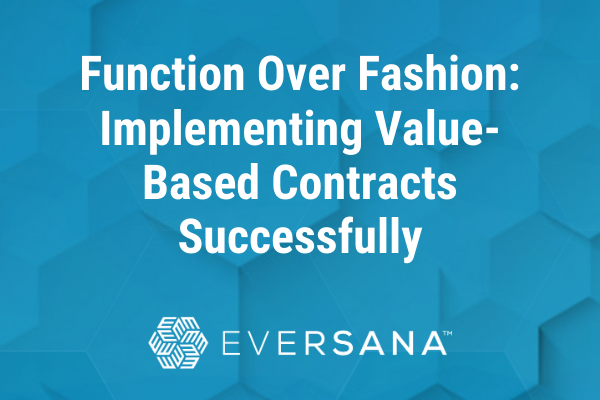
Function Over Fashion: Implementing Value-Based Contracts Successfully
Public outcry over drug pricing, increased government scrutiny, and proposed exceptions to government pricing rules propelled the healthcare industry to move from volume to value-based contracting models. Known alternatively as innovative outcomes or risk-based agreements, value-based contracts are performance contingent structures that aim to reinforce positive results, rather than just securing access and offering lower prices. These deal structures seek to: Differentiate products and services from competitors Increase share Decrease risk Secure better patient outcomes As these contracts continue to grow in popularity, manufacturers will need to assess their own capabilities, appraise market readiness, select contract partners wisely, and attain clinical input prior to execution. Download the full article to learn […]
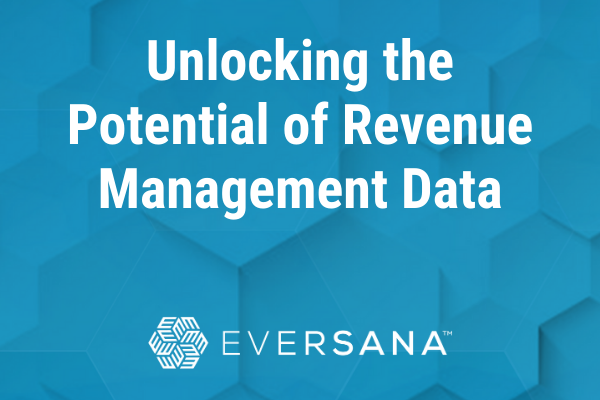
Unlocking the Potential of Revenue Management Data – Webinar
Revenue management systems hold valuable data with tremendous potential to provide business insights. Unfortunately, the power of this data is often locked behind technology barriers and reporting roadblocks such as: Data and analytics sourced from multiple platforms Transactional data sets varying across lines of business Differing objectives across departments In this webinar, EVERSANA’s Managing Consultant, Robert Blank, shares straightforward processes you can utilize to overcome these obstacles and drive insights for your managed market and commercial operations. Click here to watch the webinar.
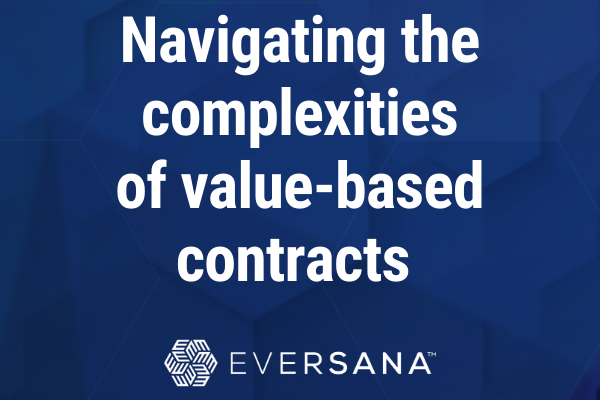
Evolving Processes to Manage Value-Based Contracts
For the past several years, the pharmaceutical industry has focused on exploring and establishing value-based contracts (VBCs) between manufacturers and their customers. In these arrangements, payments are predicated upon measurements of patient welfare, rather than formulary access, purchase volumes or market share. Yet, despite the appeal of these arrangements, many manufacturers have been reticent to adopt them, given the myriad operational challenges they pose. However, by proactively assessing their proposed contracting strategies, systematic readiness, and any downstream implications, manufacturers can mitigate potential risks while confirming and creating the operational capabilities necessary for success. In this article, Robert Blank shares best practices for navigating the operational and regulatory complexities of value-based […]

More Data, More Problems, More Potential
As the healthcare industry shifts from volume-based care to a value-based reimbursement structure, data analytics will be critical in shaping the future of the pharmaceutical industry. More so than perhaps any recent industry trend, value base contracting is positioned at a unique intersection between various disciplines in the pharmaceutical industry. Clinical data informs market research, underpins contract negotiation and drives performance terms, while transactional data reinforces the financial viability of deal structures and serves as the basis for financial projections. In aggregate, these data sets can be used to build, maintain, and advance holistic models which can assess the impact of different contracting scenarios and trace back to original assumptions […]

Challenges and Best Practices in Managing Value Based Contracts
Manufacturers face a variety of hurdles when negotiating value based contracts: from data access and standardization, deal structure variation, payment variability and scheduling, to changing laws and regulations. And, as the industry shifts to value-driven healthcare, the demand for innovative product commercialization and pricing models grows. In this webinar EVERSANA experts Robert Blank and Mike Kurland provide insight into this growing need by reviewing the obstacles associated with operationalizing value-based contracts, sharing best practices, and presenting a holistic “ideal state.” Watch the Webinar: Challenges and Best Practices in Managing Value Based Contracts

Gross-to-Net Improvement Through Holistic Revenue Enhancement
Consistent price increases have long been a staple of commercial strategy for pharmaceutical manufacturers. From this uplift in topline revenue, more sizable discounts can be provided to industry middlemen, like pharmacy benefit managers (PBMs), in order to secure more favorable formulary positioning. Rather than continue forward with traditional market access strategies, manufacturers should consider revenue management in new ways. Instead of simply confining gross-to-net activity to the pragmatic exercises of forecasting and accrual, manufacturers can expand its scope to include a strategic analysis of how liabilities can be prospectively reduced. In broadening the focus of financial planning from the perfunctory to the proactive, expenses can be viewed more as mitigatable […]

340B Drug Pricing: Challenges and Best Practices
Enacted in 1992, the 340B Drug Pricing Program was intended to stretch scarce federal resources and services to more eligible patients. Despite achieving this goal in many respects, it has also become notoriously difficult to manage for the more than 600 pharmaceutical companies enrolled. Data validity, crossover between lines of business, and conflicting regulations each serve to complicate matters in the revenue management practices of a drug manufacturer. While a comprehensive solution has yet to be created, there are procedures that can be undertaken to reduce liability and prevent revenue leakage. Through careful management of chargebacks, managed care rebates, Medicaid rebates, and government pricing, many commonly overlooked but costly […]

Streamline Chargeback and Channel Operations
Robert Blank, Managing Consultant at EVERSANA, moderated a panel with industry experts from Sanofi, Zydus, and UCB at CBI’s 15th Annual Commercial Contract and Chargeback Excellence. The topic: “Process Improvement in Contract Administration and Management — Streamlining Chargeback Operations, GPO Rosters and Channel Operations.” If you missed this presentation, download Robert’s white paper on the same topic:

Membership Management Challenges and Best Practices
In the pharmaceutical industry, access to pricing is primarily driven by membership.Institutions like hospitals, clinics, and pharmacies sign up as members of a Group Purchasing Organization (GPO) to be eligible to purchase products at a discounted rate. In turn, the GPO leverages its collective purchasing power with the pharmaceutical manufacturers to secure a lower price for its members. In order to keep track of the eligible customers, GPOs provide membership rosters to manufacturers and wholesalers with whom they are contracted. However, keeping accurate membership listings and maintaining quality customer data is becoming increasingly difficult for pharma manufacturers. The proliferation of GPOs, growth of Integrated Delivery Networks (IDNs), increasing complexity of […]

Pharmaceutical Contracting from Volume to Value
Driven by skyrocketing costs, market forces are hastening the shift in the healthcare industry from volume based care (fee for service) to a value based reimbursement structure (fee for value). While the inertia of entrenched policies, regulations, organization structures, and systems have held back the tide, industry analysts agree that the tipping point is being reached. The evolution towards this model is accelerating as patients, healthcare providers and payers realize its many benefits. The “value” in value-based healthcare is derived from measuring health performance metrics against the cost of delivering those metrics.These reimbursement models encourage healthcare providers to deliver the best care at the lowest cost. In turn, patients receive […]

Medicaid Drug Classification: Civil Monetary Penalties
On April 18, 2019, the “Medicaid Services Investment and Accountability Act of 2019” was signed into law, bringing with it a significant change to the oversight and management of the Medicaid Drug Rebate Program (MDRP). Effective immediately, this law enables the Center for Medicare and Medicaid Services (CMS) to impose civil monetary penalties on any manufacturer who incorrectly classifies their drugs. Manufacturers are then compelled to repay the resulting difference owed on any rebates for these products, regardless of whether the misclassification was purposely enacted. As with many of the changes to MDRP in recent years, the apparent intent is to better reimburse the states for the cost of drug […]
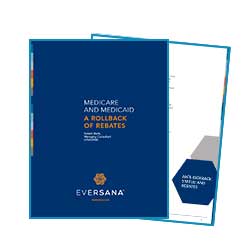
Medicare & Medicaid: A Rollback on Rebates
In January 2019, the Department of Health and Human Services (HHS) put forth a proposed rule to repeal the safe harbor status for Medicare and Medicaid drug rebates under the Anti-Kickback statute. This idea was first conveyed in the American Patients First initiative, which the Trump administration put forth in May 2018. Intended to address many of the systemic issues facing the pharmaceutical industry, its primary focus was on drug pricing. Now, with this potential ruling, HHS attempts to operationalize some of these concepts as part of the administration’s promise to “lower list prices and reduce out- of-pocket spending on prescription drugs”. If implemented, the rule would go into effect […]
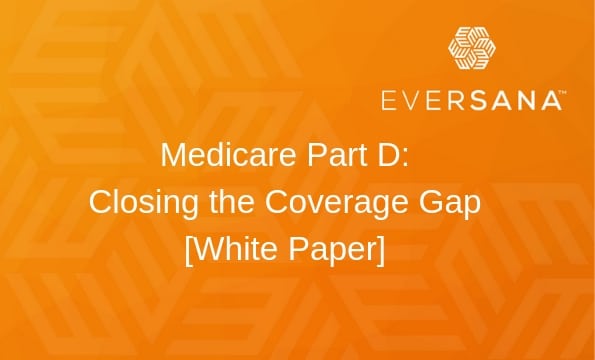
Medicare Part D: Closing the Coverage Gap
Signed into law on February 9, 2018, the Bipartisan Budget Act (BBA) of 2018 entails significant adjustments to consumer spending under the Medicare Part D prescription drug program. Beginning in 2019, the period of out-of-pocket expenses in Medicare, known colloquially as the coverage gap or donut hole, will be fully covered for beneficiaries. By requiring higher payments from pharmaceutical manufacturers, the BBA of 2018 accelerates the original time frame laid forth in the Affordable Care Act for closure in 2020. While the long-term effects are open to speculation, industry stakeholders will want to familiarize themselves with the components of this act to better prepare for its potential implications.


